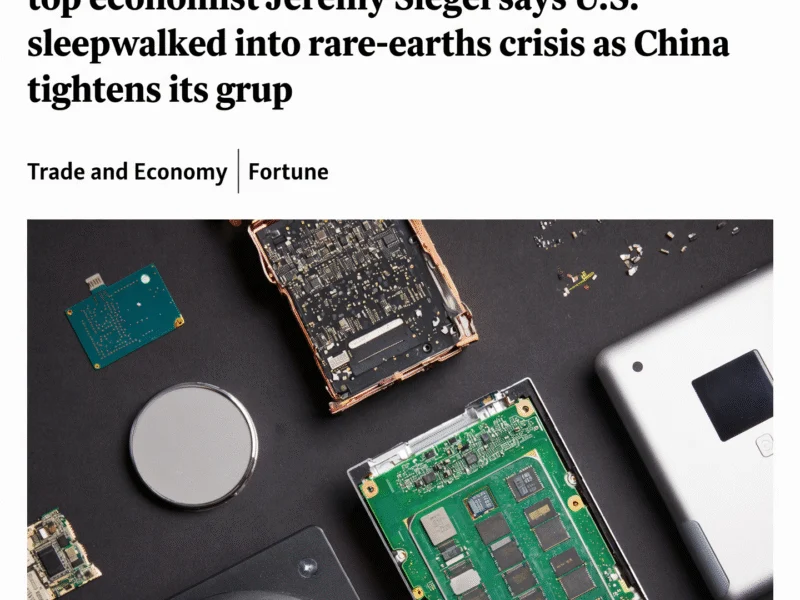Renowned Wharton economist Jeremy Siegel has labeled America’s rare earth elements vulnerability as “scandalous” following China’s sweeping new export controls that threaten global supply chains. The warning comes as China tightens its grip on the critical minerals powering everything from advanced weapons to electric vehicles, exposing what Siegel calls a major U.S. security failure.
Strategic Blind Spot in Rare Earth Dependence
Siegel’s stark assessment highlights how the United States allowed China to achieve 90% dominance in rare earth refining despite the minerals’ crucial role in modern technology. “Where were we, realizing the importance of these?” the economist questioned during his CNBC appearance, emphasizing that the situation has escalated from long-term concern to immediate economic threat. The current crisis mirrors historical energy vulnerabilities, similar to the 1970s oil shocks that led to creating the Strategic Petroleum Reserve according to energy policy experts.
China’s Export Controls Shock Global Markets
Beijing’s recent announcement requires worldwide companies to seek Chinese approval before shipping thousands of products containing even trace amounts of rare earths. The move has sent shockwaves through manufacturing and defense sectors that depend heavily on Chinese mineral processing. This isn’t the first time China has leveraged its mineral dominance during geopolitical disputes, having previously restricted exports to Japan in 2010 and hinted at using rare earths as leverage during the 2019 trade war, as documented in international trade analysis.
U.S. Response and Diplomatic Tensions
The export restrictions have triggered a forceful response from Washington, with Treasury Secretary Scott Bessent accusing Beijing of “pointing a bazooka” at global supply chains. Despite the escalating trade tensions, the much-anticipated meeting between former President Donald Trump and China’s Xi Jinping remains scheduled for the upcoming Asia-Pacific Economic Cooperation summit. Bessent confirmed in recent interviews that the U.S. is prepared to respond “with whatever it takes” to counter China’s export restrictions.
Understanding Rare Earth Elements and Their Importance
Rare earth elements comprise 17 metallic elements essential for modern technology, though they’re more abundant than their name suggests. These critical minerals enable everything from smartphones to wind turbines and advanced weapons systems. The current supply chain vulnerability stems from America’s loss of refining capacity during the 1980s and 1990s, when production shifted to China due to lower costs and environmental considerations, according to environmental policy researchers.
U.S. Efforts to Rebuild Domestic Capacity
The Pentagon and Department of Energy are actively working to reduce long-term reliance on Chinese rare earths through several initiatives:
- Funding new processing facilities in Texas and California
- Partnering with alternative suppliers like Australia’s Lynas Rare Earths
- Exploring recycling technologies for existing rare earth materials
- Developing substitute materials for certain applications
These efforts come as China’s clean technology exports continue to expand, creating additional competitive pressure beyond the rare earth sector.
Historical Context and Future Implications
China’s willingness to weaponize its mineral dominance has been demonstrated multiple times, creating what Siegel describes as a “wake-up call” for Western nations. The current situation echoes previous supply chain disruptions that have affected global markets, as seen in earlier trade war impacts on financial markets. Industry analysts suggest that building a strategic rare earth reserve similar to the petroleum reserve could take years but represents a crucial step toward supply chain security.
The rare earth confrontation represents a broader technological competition between the U.S. and China, with implications for global economic leadership and national security. As both nations navigate this escalating dispute, the outcome will likely shape critical supply chains for decades to come, according to additional coverage of mineral security issues.



